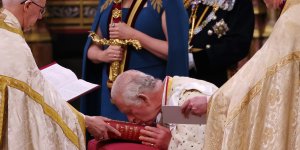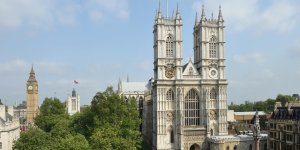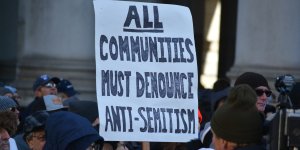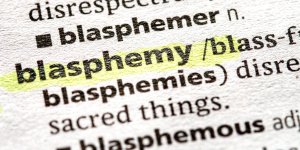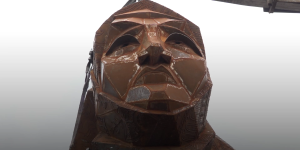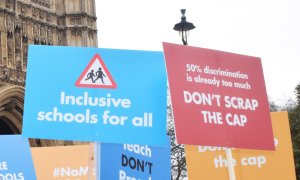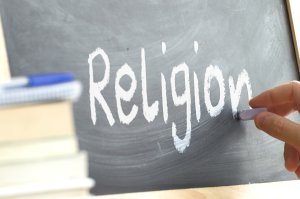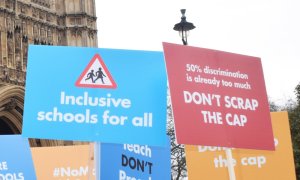Rethinking religion and belief in public life: a manifesto for change
The time has come to rethink religion's public role in order to ensure equality and fairness for believers and non-believers alike, says a major new report launched by the National Secular Society.
The report says that Britain's "drift away from Christianity" coupled with the rise in minority religions and increasing non-religiosity demands a "long term, sustainable settlement on the relationship between religion and the state".
Rethinking religion and belief in public life: a manifesto for change has been sent to all MPs as part of a major drive by the Society to encourage policymakers and citizens of all faiths and none to find common cause in promoting principles of secularism.
It calls for Britain to evolve into a secular democracy with a clear separation between religion and state and criticises the prevailing multi-faithist approach as being "at odds with the increasing religious indifference" in Britain.
Terry Sanderson, National Secular Society president, said: "Vast swathes of the population are simply not interested in religion, it doesn't play a part in their lives, but the state refuses to recognise this.
"Britain is now one of the most religiously diverse and, at the same time, non-religious nations in the world. Rather than burying its head in the sand, the state needs to respond to these fundamental cultural changes. Our report sets out constructive and specific proposals to fundamentally reform the role of religion in public life to ensure that every citizen can be treated fairly and valued equally, irrespective of their religious outlook."
Read the report:
Rethinking religion and belief in public life: a manifesto for change
Add your endorsement to the manifesto for change
Add your endorsementComplete list of recommendations
Our changing society – Multiculturalism, secularism and group identity
1. The Government should continue to move away from multiculturalism and instead emphasise individual rights and social cohesion. A multi-faith approach should be avoided.
2. The UK is a secularised society which upholds freedom of and from religion. We urge politicians to consider this, and refrain from using "Christian country" rhetoric.
The role of religion in schools
Faith schools
3. There should be a moratorium on the opening of any new publicly funded faith schools.
4. Government policy should ultimately move towards a truly inclusive secular education system in which religious organisations play no formal role in the state education system.
5. Religion should be approached in schools like politics: with neutrality, in a way that informs impartially and does not teach views.
6. Ultimately, no publicly funded school should be statutorily permitted, as they currently are, to promote a particular religious position or seek to inculcate pupils into a particular faith.
7. In the meantime, pupils should have a statutory entitlement to education in a non-religiously affiliated school.
8. No publicly funded school should be permitted to prioritise pupils in admissions on the basis of baptism, religious affiliation or the religious activities of a child's parent(s).
9. Schools should not be able to discriminate against staff on the basis of religion or belief, sexual orientation or any other protected characteristics.
Religious education
10. Faith schools should lose their ability to teach about religion from their own exclusive viewpoint and the law should be amended to reflect this.
11. The Government should undertake a review of Religious Education with a view to reforming the way religion and belief is taught in all schools.
12. The teaching of religion should not be prioritised over the teaching of non-religious worldviews, and secular philosophical approaches.
13. The Government should consider making religion and belief education a constituent part of another area of the curriculum or consider a new national subject for all pupils that ensures all pupils study of a broad range of religious and non-religious worldviews, possibly including basic philosophy.
14. The way in which the RE curriculum is constructed by Standing Advisory Councils on Religious Education (SACREs) is unique, and seriously outdated. The construction and content of any subject covering religion or belief should be determined by the same process as other subjects after consultation with teachers, subject communities, academics, employers, higher education institutions and other interested parties (who should have no undue influence or veto).
Sex and relationships education
15. All children and young people, including pupils at faith schools, should have a statutory entitlement to impartial and age-appropriate sex and relationships education, from which they cannot be withdrawn.
Collective worship
16. The legal requirement on schools to provide Collective Worship should be abolished.
17. The Equality Act exception related to school worship should be repealed. Schools should be under a duty to ensure that all aspects of the school day are inclusive.
18. Both the law and guidance should be clear that under no circumstances should pupils be compelled to worship and children's right to religious freedom should be fully respected by all schools.
19. Where schools do hold acts of worship pupils should themselves be free to choose not to take part.
20. If there are concerns that the abolition of the duty to provide collective worship would signal the end of assemblies, the Government may wish to consider replacing the requirement to provide worship with a requirement to hold inclusive assemblies that further pupils' 'spiritual, moral, social and cultural education'.
Independent schooling
21. All schools should be registered with the Department for Education and as a condition of registration must meet standards set out in regulations.
22. Government must ensure that councils are identifying suspected illegal, unregistered religious schools so that Ofsted can inspect them. The state must have an accurate register of where every child is being educated.
Freedom of expression - Freedom of expression, blasphemy and the media
23. Any judicial or administrative attempt to further restrict free expression on the grounds of 'combatting extremism' should be resisted. Threatening behaviour and incitement to violence is already prohibited by law. Further measures would be an illiberal restriction of others' right to freedom of expression. They are also likely to be counterproductive by insulating extremist views from the most effective deterrents: counterargument and criticism.
24. Proscriptions of "blasphemy" must not be introduced by stealth, legislation, fear or on the spurious grounds of 'offence'. There can be no right to be protected from offence in an open and free secular society.
25. The fundamental value of free speech should be instilled throughout the education system and in all schools.
26. Universities and other further education bodies should be reminded of their statutory obligations to protect freedom of expression under the Education (No 2) Act 1986.
Religion and the law
Civil rights, 'conscience clauses' and religious freedom
27. We are opposed in principle to the creation of a 'conscience clause' which would permit discrimination against (primarily) LGBT people. This is of particular concern in Northern Ireland.
28. Religious freedom must not be taken to mean or include a right to discriminate. Businesses providing goods and services, regardless of owners' religious views, must obey the law.
29. Equality legislation must not be rolled back in order to appease a minority of religious believers whose views are out-of-touch with the majority of the general public and their co-religionists.
30. The UK Government should impose changes on the rest of the UK in order to comply with Human Rights obligations. Every endeavour should be made by to extend same sex marriage and abortion access to Northern Ireland.
Conscience 'opt-outs' in healthcare
31. Efforts to unreasonably extend the legal concept of 'reasonable accommodation' and conscience to give greater protection in healthcare to those expressing a (normally religious) objection should be resisted.
32. Conscience opt-outs should not be granted where their operation impinges adversely on the rights of others.
33. Pharmacists' codes should not permit conscience opts out for pharmacists that result in denial of service, as this may cause harm. NHS contracts should reflect this.
34. Consideration should be given to legislative changes to enforce the changes to pharmacists codes recommended above.
The use of tribunals by religious minorities
35. The legal system must not be undermined. Action must be taken to ensure that none of the councils currently in operation misrepresent themselves as sources of legal authority.
36. Work should be undertaken by local authorities to identify sharia councils, and official figures should be made available to measure the number of sharia councils in the UK to help understand the extent of their influence.
37. There needs to be a continuing review by the Government of the extent to which religious 'law', including religious marriage without civil marriage, is undermining human rights and/or becoming de facto law. The Government must be proactive in proposing solutions to ensure all citizens are able to access their legal rights.
38. All schools should promote understanding of citizenship and legal rights under UK law so that people – particularly Muslim women and girls – are aware of and able to access their legal rights and do not regard religious 'courts' as sources of genuine legal authority.
Religious exemptions from animal welfare laws
39. Laws intended to minimise animal suffering should not be the subject of religious exemptions. Non-stun slaughter should be prohibited and existing welfare at slaughter legislation should apply without exception.
40. For as long as non-stun slaughter is permitted, all meat and meat products derived from animals killed under the religious exemption should be obliged to show the method of slaughter.
41. In public institutions it should be unlawful not to provide a stunned alternative to non-stun meat produce.
Religion and public services
Social action by religious organisations
42. The Equality Act should be amended to suspend the exemptions for religious groups when they are working under public contract on behalf of the state.
43. Legislation should be introduced so that contractors delivering general public services on behalf of a public authority are defined as public authorities explicitly for those activities, making them subject to the Human Rights Act legislation.
44. It should be mandatory for all contracts with religious providers of publicly-funded services to have unambiguous equality, non-discrimination and non-proselytising clauses in them.
45. Public records of contracts with religious groups should be maintained and appropriate measures for monitoring their compliance with equality and human rights legislation should be put in place.
46. There should be an enforcement mechanism for the above, which would for example receive and adjudicate on complaints without complainants having to take legal action.
Hospital chaplaincy
47. Religious care should not be funded through NHS budgets.
48. No NHS post should be conditional on the patronage of religious authorities, nor subject directly or indirectly to discriminatory provisions, for example on sexual orientation or marital status.
49. Alternative funding, such as via a charitable trust, could be explored if religions wish to retain their representation in hospitals.
50. Hospitals wishing to employ staff to provide pastoral, emotional and spiritual care for patients, families and staff should do so within a secular context.
Institutions and public ceremonies
Disestablishment
51. The Church of England should be disestablished
52. The Bishops' Bench should be removed from the House of Lords. Any future Second Chamber should have no representation for religion whether ex-officio or appointed, whether of Christian denominations or any other faith. This does not amount to a ban on clerics; they would eligible for selection on the same basis as others.
Remembrance
53. The Remembrance Day commemoration ceremony at the Cenotaph should become secular in character. Ceremonies should be led by national or civic leaders and there should be a period of silence for participants to remember the fallen in their own way, be that religious or not.
Monarchy and religion
54. The ceremony to mark the accession of a new head of state should take place in the seat of representative secular democracy, such as in Westminster Hall and should not be religious.
55. The monarch should no longer be required to be in communion with the Church of England nor ex officio be Supreme Governor of the Church of England, and the title "Defender of the Faith" should not be retained.
Parliamentary prayers
56. We believe Parliament should reflect the country as it is today and remove acts of worship from the formal business of the House.
Local democracy and religious observance
57. Acts of religious worship should play no part in the formal business of parliamentary or local authority meetings.
Public broadcasting, the BBC and religion
58. The BBC should rename Thought for the Day 'Religious thought for the day' and move it away from Radio 4's flagship news programme and into a more suitable timeslot reflecting its niche status. Alternatively it could reform it and open it up to non-religious contributors.
59. The extent and nature of religious programming should reflect the religion and belief demographics of the UK.
Add your endorsement to the manifesto for change
Add your endorsementThe 2017 General Election
Secularism in 2023: A year in review
As the year draws to a close, we reflect on the moments, stories, and insights that shaped our work, through the blogs we've published.
The universality of human rights needs defending
Seventy-five years on from the adoption of the Universal Declaration of Human Rights, its promise of freedom and equality remains a distant dream for those living under religious rule, says Stephen Evans.
The time to disestablish the Church of England has come
Lib Dem peer Paul Scriven explains why he has introduced a bill in parliament to separate Church and state.
Time for Church and state to part ways
Separating church and state would signal a forward-looking Britain committed to equality, inclusivity and freedom of religion or belief. National Secular Society CEO Stephen Evans explains why the NSS is backing a bill to disestablish the Church of England.
We must stop charities promoting antisemitism
The horrific attack on Israel by Islamist terrorists Hamas, and Israel's subsequent response, have unleashed unprecedented antisemitism on our streets.
Antisemitic incidents in the UK have more than quadrupled since October 7th, according to the Community Security Trust. They have included assaults, vandalism and abusive behaviour.
Perhaps most shocking of all, three Jewish schools decided to close for the day last week, over security fears relating to pro-Palestine protests. Their fears were not unfounded. It has since emerged that two Jewish schools have been vandalised with red paint.
That children have been forced out of school because of the threat of racist attacks is a national disgrace.
It is deplorable that anti-Muslim incidents have also increased. But according to the deputy assistant commissioner for the Metropolitan Police, this increase is "nothing like the scale of the increase in antisemitism".
This sudden flare up of antisemitism didn't come from nowhere. Antisemites weren't created overnight when Hamas attacked Israel. What we're seeing is the emboldening of those who have been harbouring hatred of Jews for years.
Worst of all, UK charities have had a hand in this. Specifically, charities getting away with promoting antisemitism under the charitable purpose of 'the advancement of religion'.
They include Islamic Research Foundation International (IRFI), an organisation which registered as a charity in 2007 and financed an Islamic TV channel called Peace TV. In 2016 Peace TV was fined by broadcast regulator Ofcom after a speaker on one of its shows described Jews as "like a cancer", "evil genius" and "cursed people".
Thankfully, IRFI was shut down last year after multiple complaints to the Charity Commission, including from the NSS – over ten years after it was registered.
But charities which are shut down after promoting antisemitism are few and far between. Most appear to continue with impunity.
They include Miftahul Jannah Academy, which published sermons on its website by Islamic scholar Muhammad Patel describing Jews as having "dirty" qualities and saying Allah turned some Jews into "apes and monkeys and pigs" because Allah is "angry" with them. Patel also preached at Walthamstow Central Mosque, run by the charity Masjid-E-Umer Trust. While these lectures disappeared from the web after the NSS complained to the Charity Commission, both charities are still operating and it's not clear what sanctions, if any, they have received.
Then there's Islamic Centre Leicester, which hosted a sermon uploaded to YouTube a few months ago saying Jews have "greed of long life" because they fear punishment in the afterlife. Again, the content was removed after the NSS told the regulators, but no further action appears to have been taken – even though this is the second time the NSS has registered concerns about extremism at this charity.
Most bizarre of all is the case of Cricklewood Muslim Youth Trust (CMYT). In 2021, the Campaign Against Antisemitism lodged a complaint with the Charity Commission after CMYT tweeted an image warning Muslims to "Keep away from the enemies of Allaah the Jews & Christians".
It turned out that CMYT wasn't a registered charity at the time of the complaint. But what is shocking is the Charity Commission's response, which was to tell CMYT to register as a charity. That's right – the commission opened the door for an antisemitic organisation to get the tax relief and 'seal of approval' which comes with registered charity status.
Unsurprisingly, the Charity Commission was reluctant to disclose this when the NSS asked about it. It only did so once the NSS got the Information Commissioner's Office involved. The Charity Commission said it initially refused to answer because the information could "lead to negative perceptions of charities". Indeed.
It shouldn't surprise us that these charities have promoted other forms of extremism alongside antisemitism. Peace TV was additionally fined by Ofcom for shows condoning the execution of apostates from Islam. Other lectures published by Miftahul Jannah praised the Taliban and said Muslims should help Islamic nations which want to fight to buy machine guns. Islamic Centre Leicester has repeatedly suggested the punishment for apostates and 'blasphemers' is death. And CMYT said on its YouTube account that "protests, debates, free society and democracy" are all prohibited in Islam.
Antisemitism, jihadism and the rejection of liberal values all flow from the same place: a fundamentalist and supremacist interpretation of the Islamic religion.
This is where the problem lies. "The advancement of religion" is a recognised charitable purpose, which means an organisation can register as a charity simply by promoting religion – even, it seems, if that religion is at odds with equality, community cohesion and the duty on charities to provide a public benefit. All the above charities are registered under "the advancement of religion", and regulators are seemingly powerless to put a meaningful end to their extremism. When a regulator's reaction to a complaint about antisemitism is to tell the perpetrator to get registered, you know there's a problem.
That's why "the advancement of religion" needs to be removed from the list of charitable purposes. This won't stop religious charities which do genuine good from registering, as their activities will be covered by a different charity purpose. But it will help put an end to charities advancing religions that spread antisemitism and other forms of extremism. And recent incidents demonstrate we need to end this now more than ever.
Bishops, know your place: it’s not in parliament
It was with great lamentation and gnashing of teeth that members of the Church of England reacted to news this week that the archbishop of Canterbury's request for a meeting with the Home Secretary was refused.
An incandescent Dominic Grieve took to the airwaves of Radio 4 to denounce Suella Braverman as "extraordinarily rude" for not acceding to meet the archbishop to discuss the government's immigration bill. The former attorney general, himself an Anglican, superciliously opined that the archbishop comes "well ahead" of the Home Secretary in "the order of precedence in this country". Dripping with condescension, and arguably misogyny, he concluded Braverman should "know her place".
Readers will have their own opinions of the Home Secretary, but the nation's democratic representatives should not be expected to prostrate themselves before a cleric who sits ex officio in the Lords by virtue of Victorian statute.
The whole episode lays bare the Church's unabashed sense of entitlement: How dare we be denied the privileged political access we have always taken for granted? "There was shock internally" and it was "a big slap in the face", an unnamed former senior adviser to the Lords Spiritual noted dolefully. Those officials who did meet with the Home Office were made to feel like "lepers", he added with appropriately biblical melodrama.
Lambeth Palace, the office of the archbishop, was very straightforward: "In the past the Archbishop has met other Home Secretaries. It is not unusual."
Maybe not for Lambeth Palace, but the public will rightly question this level of influence given how wildly out of step the Church is with society on issues of fundamental importance, such as reproductive rights, same-sex marriage and assisted dying.
Perhaps it should come as no surprise that the Church has reacted with such opprobrium. After all, bishops are used to VIP treatment in the Lords. By convention, other peers must give way when a Lord Spiritual rises to speak. And there is an unwritten expectation that letters sent by primates to ministers should be answered within two weeks. Constituents and civil society organisations can only dream of such a prompt response.
There are also those Anglicans, such as Conservative MP Chris Loder, who support the bishops' bench in principle, but wish they would pipe down when their message is politically inconvenient. This is to have your cake and eat it. Of course, when bishops are given automatic seats in the legislature, they will use them to politically pontificate and further their own ends. As Loder said, they act as "politicians that wear mitres".
But that's precisely because that is what they are legally empowered to do. There is no clause in the Bishopric of Manchester Act 1847 – the law which enshrines 26 seats by right for Anglican bishops – which precludes them from participating in the political cut and thrust of the Lords.
If, as he says, he truly believes that bishops should focus on "the cure of souls" rather than "the political issues of the day", there is one very simple solution: abolish their automatic seats and dispatch them back to their dioceses posthaste.
Freedom of religion or belief must include the freedom to ‘blaspheme’
The freedom to question and criticise religious ideas in the same manner as any other kind is foundational to a democratic society. Where it exists at all, this freedom is constantly threatened, both by its traditional enemies of theocracy and religious fundamentalism, but also increasingly from a misguided interpretation of liberal values.
A recent report from the United States Commission on International Religious Freedom identified 95 countries which criminalise blasphemy in some way. That number is at least one too few, as it fails to include the United Kingdom, where the offences of blasphemy and blasphemous libel remain on the books in Northern Ireland.
Punishments in countries which outlaw blasphemy vary, from fines to imprisonment and execution. Unjust though such legal processes are, the extra-judicial violence licenced and encouraged by such laws is of equal importance. The Center for Inquiry, which established September 30th as International Blasphemy Rights Day, has said to "charge someone with blasphemy is to value a person's life less than an idea". Though this is particularly true in countries such as Nigeria and Pakistan, where those accused of blasphemy are often murdered, it is also the case worldwide. Last year, Sir Salman Rushdie was attacked in Chautauqua, New York, 34 years after the Ayatollah Khomenei called for his murder for the supposed offence of blasphemy.
Those who would impose and enforce blasphemy codes on others do not respect or recognise national borders or sovereignty. A commitment to free speech must therefore be equally international in its scope. In failing to fully abolish its blasphemy laws, the UK validates the notion that perceived offence to religion or God should be prohibited, thereby undermining its ability to promote the right to freedom of expression elsewhere.
Attempts to shield religion from criticism are also underway via systematic efforts to characterise such criticism as a form of racial or ethnic bigotry. The concept of 'Islamophobia', vigorously promoted by Islamists both in the UK and abroad, is the most pressing example. Integral to the concept is the claim that criticism of ideas is equivalent to attacking individuals. Under the term's definition formulated by the All Party Parliamentary Group on British Muslims (APPG), to question Islamic ideology is to effectively express hate for Muslims.
This is a blasphemy law in another form – a point demonstrated by the case of Erika López Prater, who was fired last year by Hamline University after discussing artistic representations of Muhammad in an art history class. A Muslim student complained that as images of Muhammad are banned in Islam, the content of the lesson – and by extension Prater – was thus blasphemous and Islamophobic.
By agreeing that images of Muhammad are Islamophobic and should therefore not be shown, Hamline generalised the personal feelings and religious interpretation of one individual as the definitive position of Islam. But this view is not shared by all Muslims. As Anna Khalid - an associate professor of history at Carleton College and herself a Muslim - pointed out, in endorsing the supposed Islamic ban on images of Muhammad, Hamline "privileged a most extreme and conservative" point of view.
A policy which empowers the most fundamentalist elements within a religious community is neither liberal nor inclusive. Yet that is precisely what the current arguments around 'hate speech' have achieved. What we have, in effect, is a code which polices a particular theological interpretation of Islam against other interpretations. It is a gross perversion of laws intended to protect the right to freedom of religion or belief to enlist them in sectarian theological disputes in this way.
If the right to freedom of religion or belief means anything, it must include the right of those within religious groups considered blasphemous by more doctrinaire views to practice their faith as they see fit. The current understanding of 'Islamophobia' threatens those who perceived not to conform to traditional theology – Muslim women who reject the hijab, openly LGBT Muslims, and minorities within the religion such as Ahmadis, for example. It is absurd to think that a gay Muslim could be labelled 'Islamophobic' for criticising elements of their own faith which are homophobic. Yet under the current conceptual framework, such criticism could be labelled as such. The ability to criticise religion must therefore be seen as an essential component of the right to freedom of religion or belief, not in conflict with it.
However well-intentioned, politicians who endorse the concept of 'Islamophobia' are effectively reintroducing blasphemy laws by the backdoor and empowering fundamentalists within religious communities in the process. Concerningly, a significant part of the UK's political establishment appears unaware of the problem – the APPG definition has been accepted by all major parties except the Conservatives, along with one in seven UK local authorities.
The UK must not sacrifice the right to free speech in a misguided attempt to promote social cohesion. Secularism, and a robust defence of the ability to criticise all ideas and ideology, is the only genuine way to achieve an properly inclusive society which respects everyone's right to freedom of religion or belief. In defending that right, we must remain vigilant.
Image: frank333, Shutterstock
A monument to hijab is no way to celebrate women
A 16ft steel statue of a grim-faced women clad in an Islamic veil looms over a largely Muslim community. Weighing around a tonne and sharply angular, she evokes the totalitarian aesthetic of brutalist architecture: cold, imposing and inhuman. At her base is her name: "The Strength of the Hijab".
One can imagine such a statue in the centre of an Islamist theocracy such as Iran or Afghanistan – if radical Islam did not forbid depictions of people, let alone women, of course – as a reminder and warning to women who dare consider flouting these countries' tyrannical Islamic 'modesty' laws.
But this statue isn't in Iran or Afghanistan. It's to be erected in a park in Smethwick, Birmingham, this October. And its message is not to condemn the hijab as the misogynistic tool of women's oppression that it is in so many countries, but to celebrate it.
It's worth remembering at this point that on Saturday, days before the news of the statue was announced, the world mourned the first anniversary of the death of Mahsa Amini. Amini was a 22 year old woman who died at the hands of Iran's 'morality police' because she apparently wasn't wearing hijab correctly. According to witnesses, Amini was tortured in the back of a police van. Medical evidence suggests she died from severe head injuries inflicted during this torture.
Since Amini's death and the worldwide protests it sparked, Iran's response has been to double down on its subjugation of women and dissenters. Penalties for women who do not adhere to 'modesty' codes include imprisonment and severe fines. The regime has recently announced that businesses whose female employees failed to adhere to mandatory hijab requirements will also be punished.
The UK government's response has included sanctions on Iran's officials, the latest coordinated with other democratic countries on Friday. The timing, one day before the anniversary of Amini's death, was deliberate, to "send a clear message that the UK and our partners will continue to stand with Iranian women and call out the repression it is inflicting on its own people".
That's why the revealing ('unveiling' clearly isn't the right word) of Smethwick's new statue this week is a slap in the face of every woman who rejects hijab codes. It's as if it was timed as an act of triumph against Iran's courageous women who dare to show their hair. It feels like a tribute to the morality police who crush women's rights every day under their heels.
That probably wasn't the intention of those responsible for this statue. It was commissioned by Legacy West Midlands, a registered charity which "has its roots in celebrating the heritage of post-war migrant communities in Birmingham". Luke Perry, who created the sculpture, said: "The location of where it's going is Smethwick, [where] there's a humongous part of the community that is from the Islamic faith.
"They wear the hijab as part of their community, and it is really underrepresented."
These statements reveal that the statue's conception is likely rooted not in explicit support of Islamism, but in ignorance and an unwillingness to think critically about religious practices which are at odds with democratic values.
The assumption that all Muslim women in Smethwick wear hijab is simplistic and plays directly into Islamist narratives that Muslim women who decide not to cover their hair are not real Muslims at all. And in hardline Islam, the penalty for Muslims who are perceived to have left the faith by defying it is severe.
It's not hard to imagine many Muslim women who choose not to wear hijab will feel uncomfortable at being 'watched' by this inanimate incarnation of the morality police. It will add to the pressure they already feel to toe the line with more fundamentalist members of their community and don the headscarf.
Those who are truly underrepresented are the women, Muslim and non-Muslim alike, who defy Islamist demands to cover up. There are thousands of them around the world, but they are silenced, harassed, threatened, imprisoned, tortured, raped, and murdered for their defiance.
The statue's base reads: "It is a woman's right to be loved and respected whatever she chooses to wear. Her true strength is in her heart and mind."
Few things could be a worse symbol for this sentiment than this statue. Far more fitting would a tribute to the women who bravely remove their hijab, such as the iconic women behind the White Wednesday movement in Iran who posted videos and photos of themselves removing their hijab in public.
All the decisions which led to the display of this statue show that British authorities are dangerously naïve when it comes to religion. They still operate under the belief that religion is a wholly positive force to be respected, accommodated and showcased, not something to be questioned.
And those who do question it may find themselves severely punished. Just as Councillor Mike Gilbert was in May, when he was denied the mayoralty of Boston Council because of social media comments he made during the World Cup in Qatar about Islam's treatment of women and gay people.
As a new report this week revealed, one in seven local authorities has adopted a definition of "Islamophobia" which could easily silence criticism of Islam, including the hijab. This no doubt makes it even harder for decision makers to express their concerns about religious issues.
Perhaps this is why Sandwell Metropolitan Borough Council so readily approved the "Strength of Hijab" statue in August.
At a time when the UK should be prioritising community cohesion and basic human rights of all its citizens, its accommodation of religious fundamentalism threatens to deepen divides and drive the already marginalised further from public life.
Monuments to symbols of religious oppression are the last thing we need. We should instead be highlighting the struggles of individuals around the world who put their lives on the line standing up for values which bring us together: equality, democracy and freedom. Rather than celebrating the hijab, let's celebrate the women who bravely tear it off for the sake of those values.
Don't extend religious privilege in parliament - end it
If you're vexed by Anglican clerics sitting as of right in our legislature deciding on the laws that affect us all, would you be assuaged by the idea of the bishops being joined by an assortment of imams, rabbis and priests?
No, I thought not.
But whenever the question of House of Lords reform comes up, the so called 'solution' of multifaith 'lords spiritual' is floated.
A recent survey of Church of England clergy found that almost half of them think the seats currently reserved for Anglican bishops in the House of Lords should be shared with other faith leaders.
This idea isn't new.
As long ago as 1970 the Archbishops' Commission on Church and State accepted the reduction of the number of bishops to 16 and proposed that the additional places be taken by other religious leaders.
In 1985 Conservative MP Richard Holt tabled an amendment to reduce their numbers to 14. Holt's plan involved replacing nine of the Church of England's bishops with representatives from other faith groups.
Then, in 1999, a report from The Royal Commission on the Reform of the House of Lords suggested the second chamber should have fewer Church of England peers to allow for more non-Christian representatives and other Christian denominations.
In 2011, a paper produced by the Conservative Christian Fellowship called for a "broad bench of Lords Spiritual", saying there was a "strong argument that our legislature would benefit from the wisdom of leaders of Baptist, Catholic, Methodist and black-led congregations".
The Woolf Institute's Commission on Religion and Belief in Public Life also published a report in 2013 which called for the representation of religion in the House of Lords to be reformed to "give voice to a greater variety of religious voices".
That support for a multifaith arrangement should come from within the Church of England itself isn't surprising. They know the game is up. In a country which even they concede can no longer be called Christian, their unique privileges are increasingly hard to justify. They know that their only real hope of retaining privileged political influence is to share the privilege around a bit.
Under the present arrangement, 26 Anglican bishops sit as legislators in the House of Lords by right of their position within the established Church.
This situation is unique in the democratic world. Iran is the only other country that provides seats as of right for clerics in its national legislature. The bishops' role in the House of Lords dates back to the feudal and medieval days of the 14th century – and is clearly unfit for a 21st century democracy.
Reform is long overdue. But a multifaith approach is fundamentally flawed and entirely unworkable.
On point of principle, why should religious groups enjoy preferential and automatic status in the country's legislature? There's no sound rationale for providing any distinct explicit representation for religious bodies in a modern, democratic chamber.
It is sometimes argued that the bishops' bench helps to maintain a space for religion in public life. But it's not clear why any special interest group should have a special space carved out for them. Religion is well equipped to compete just fine in the marketplace of ideas without a leg up.
The aspiration to make the House of Lords representative of the diverse beliefs and perspectives within the UK is sound. But under the current appointments system, this pluralism can be achieved by ensuring appointments reflect the UK's diversity in all its forms. Religious leaders can and have been appointed to the House of Lords through the existing appointments process. Such appointments should be on merit rather than as of right.
And it's worth noting that many temporal peers are religious – a much higher proportion than in the country, partly because of their greater average age. Many use their position to advocate for their faith. Religious interests are very well served in parliament without the need for special seats to be 'reserved'.
It has been suggested that religious leaders add value by bringing a moral dimension into parliamentary proceedings. This idea is as outdated as it is offensive. Religious leaders aren't the moral compass of the country. Quite the contrary, considering the public's opinion on issues ranging from same-sex marriage to assisted dying. Ordinary members of the House, whether religious or nonreligious, are just as able to bring ethical, moral, spiritual or philosophical perspectives into legislative deliberations.
And there certainly doesn't seem to be any desire amongst the public to have religious representatives automatically appointed to the second chamber. A 2021 YouGov survey found only 16% of British people believe bishops should be entitled to a seat in the House of Lords. It's hard to see that support rising if a collection of other faith leaders were to join them.
A multifaith approach to the lords spiritual would pose significant practical problems, too.
The question of which faith communities would be represented, and then identifying and selecting individuals who could legitimately represent those faith communities, would be both extremely difficult and highly divisive.
Unlike the Church of England, many denominations and faiths don't have a hierarchical structure. There is no supreme governing body in Hinduism, Sikhism, Buddhism or Islam. Which schools of thought would be represented and who would represent them? Would Ahmadis, who are considered non-Muslims by many mainstream Muslims, be represented, too?
The Chief Rabbi may be the rabbinical authority of the Orthodox sector, but his authority isn't recognised by the Reform Synagogues or by other congregations. Canon law doesn't even permit Roman Catholic priests to be members of secular legislative bodies, so would Catholic representation need to be undertaken by lay Catholics? Would Mormons and Jehovah's Witnesses, as Christian denominations, be treated on an equal footing with others? Would Nonconformists, Pagans and Humanists get a seat at the table? Would their consciences even allow them?
The whole concept of multifaith lords spiritual is a non-starter. Our democracy shouldn't be organised along the lines of Radio 4's Thought for the Day.
Removing seats 'as of right' for religious leaders is a more sensible, suitable and sustainable approach for a modern democracy.
Local authorities in Scotland are leading the way here by removing voting privileges of the religious representatives they are required by law to appoint to their education committees. The next step is surely to remove the obligation to appoint them in the first place. The same goes for the bishops in the Palace of Westminster.
Reserving a special role in policymaking for representatives of religious institutions runs counter to principles of equality. And this is the principle that should guide Lords reform. Religion should take its place alongside all other special interest groups and lobby through the same democratic channels.
People of all faiths and none should be encouraged to participate in our democracy, but it should be on the basis of equality rather than privilege.
Image: Roger Harris, Wikimedia Commons
Denmark stood up against fundamentalists in the past. It must not give in now
It is now almost two decades since an organised campaign of lies, threats and violence attempted to force Danish society to abandon its right to freedom of expression and in its place install a particularly regressive version of Islamic blasphemy codes.
In late 2005, a number of Danish Muslim organisations, together with the authorities of several Muslim-majority countries, tried to bully the Danish government into interfering with the publication of the Jyllands-Posten newspaper. The paper had printed a dozen cartoons of Muhammad as part of an editorial discussing criticism of Islam and self-censorship.
Eleven ambassadors from Muslim-majority countries requested that Denmark suppress the paper's right to operate freely and to pursue those responsible for the cartoons under the "law of the land". The prime minister declined, pointing out that it would be illegal for him to do so. Furthermore, he would not denounce the paper, and would not meet with the concerned diplomats to discuss the matter. For this, Denmark saw its embassies violated, citizens attacked, and economy sabotaged.
Today, Muslim fundamentalists are once again demanding that Denmark and its neighbour Sweden give up their democratic principles in order to placate their offended feelings. In recent weeks, copies of the Quran have been set alight at several protests in both nations, primarily by unsavoury characters from the far right-wing of Scandinavian politics, although on at least one occasion by an Iraqi asylum-seeker.
The choice to destroy, rather than contribute, written words is not accidental. Publishing an illustration of Muhammad makes the point that blasphemy codes apply only to those who choose to follow them. Any statement of principle to be found in the burning of a religious text is far weaker. Indeed, the act is inherently anti-intellectual and contemptuous of literature – in that regard exhibiting the same mindset as the hysterical Islamist mobs calling for retribution.
But focusing on the nature of the act is a mistake. The crucial point is that Denmark and Sweden should not modify their fundamental values according to the dictates of a gang of theocratic crooks.
Concerningly, both governments are considering doing exactly that. The Swedish judiciary has already had to prevent the government from encroaching on the rights of its citizens, and the Danish government is now joining them in seeking 'legal means' to prevent further protests.
Their desire to do so is not incomprehensible. Sweden has already seen its embassies besieged, diplomatic staff shot, and stern warnings of potential attacks issued by its security services. Attempts have also been made to isolate both internationally, with the Organisation of Islamic Cooperation – a collection of 57 nations that claims to "safeguard and protect the interests of the Muslim world" – condemning the burnings as "acts of aggression that spread hatred and contempt for religions and threaten global peace, security and harmony".
For this group, which includes some of the most vicious and repressive regimes on earth, to lecture others on human rights and the spreading of hatred is hypocrisy of the most shameless kind. Faced with such pressure, one would hope that the UK, EU and US might make some expression of solidarity with their democratic allies. Instead, they have each issued mealy-mouthed statements condemning the supposed acts of desecration.
European nations may think these efforts of appeasement will make them safer. They will not. Does anyone seriously believe that, were a ban on burning the Quran implemented, those voicing their displeasure would pack up and go home, now satisfied that their terms had been met and never to be seen again?
Of course not. It is not just the content of any freely expressed remarks or actions which religious fundamentalists are opposed to, but also, and more importantly, the principle that anyone should be able to speak about their faith opinions in a way they do not like.
No quarter should be given to this way of thinking. To act as an apologist when a Quran is burnt because it is 'hateful' is to validate violent intimidation as a means to bring about a political agenda.
It also encourages further thuggish behaviour of the kind perpetuated against Sweden in recent weeks. If concessions to such efforts at intimidation continue to be made, there will come a point at which the essential components of a free society will cease to function.
In 2005, the Danish authorities ultimately did not retreat from a defence of their values. To do so now would be a grave mistake. Fundamentalists say that any offence to their faith is 'intolerable'. We should make it clear: in a democracy, prioritising religious feelings above freedom of expression is intolerable.
Image: Protestors against Quran burning in Sweden outside the Sweden Embassy of London, January 2023. Credit: Loredana Sangiuliano, Shutterstock
The 2015 General Election
Islamic charity stokes fear of ’black magic’ and promotes exorcism
Islamic charity in Birmingham warns of "the sinister repercussions of magic" and the "snares of sorcerers"
NSS joins open letter against faith school discrimination
Education experts, politicians, religious leaders and public figures unite to call on Education Secretary to keep the faith school admissions cap.
NSS hosts talk with author of Annie Besant book
Renowned author Michael Meyer discusses 'A Dirty, Filthy Book' in online event.
Faith school found inadequate for ten years fails inspection again
Jewish school where teachers slapped children criticised for poor secular education in latest inspection.
NSS urges PM to retain cap on faith-based admissions
Supporters of inclusive schools encouraged to tell MPs to protect the 50% cap.
UN raises concerns over ‘gay conversion’ charity after NSS briefing
Charity regulator's failure to act on gay conversion therapy suggests it is "a protected religious practice" in Northern Ireland, says UN
NSS alarmed at plan to let new schools select all pupils based on faith
Faith-based academies could be free to select all pupils based on religion within months, sources say.
Three years on, the lessons of Batley are yet to be learned
The Batley affair exposed the Islamist threat to UK schools. We're still yet to come to terms with its implications, says Jack Rivington.
Councils say faith schools disadvantaging looked after children
Evidence increasing that faith schools disadvantage those with greatest need.
Bill to legalise assisted dying introduced in Scottish Parliament
Reform in assisted dying law supported by 78% of Scots.

